

US Market Analysis | February-June 2025
The beauty industry is having to re-evaluate its marketing strategy to account for changes in user behavior across search.
While brands pour millions into Google Ads and SEO, consumers are turning to AI for beauty advice. ChatGPT, Claude, Gemini, and Perplexity are the new discovery engines for skincare and makeup recommendations.
Brands not optimized for AI citation and zero-click search are losing approximately 60% of organic traffic. This shift in user search behavior also comes with an uneven playing field where a few dominant players are gaining increased market control. The top 10 domains capture 36.7% of all beauty AI citations, a concentration that creates both massive opportunities and gaps in strategy.
But here’s what’s surprising: it isn’t brands themselves that are cited in LLMs when answering user questions. Instead, LLMs rely on a concentrated network of trusted domains to fill their knowledge base and retrieve accurate information.
Purchasing behavior in the US beauty market has fundamentally shifted and is at an inflection point. Traditional SEO delivered diminishing returns as consumer behavior shifts, while AI discovery on ChatGPT and Perplexity alone grew over 400% in the same period. Our analysis of 135,419 beauty-specific citations from 5.7 million total AI responses reveals a new discovery architecture that will define winners and losers for the next decade.
Between February and June 2025, we captured 5.7 million citations across ChatGPT (GPT-4o), Gemini 1.5, Claude 3.7 Sonnet, and Perplexity Pro. From this dataset, we isolated 135,419 citations specifically tied to beauty and personal care queries spanning skincare, makeup, and hair care.
Our analysis included the development of a proprietary Influence score that weighs:
This data allows us to predict the importance of each domain to identify which ones are most relevant to each LLM, and each brand.
So, what domains are prioritized in beauty and personal care right now?
These are the top 10 domains that showed up the most often in AI answers related to Beauty & Personal Care, ranked by citation frequency and how many models cited them:
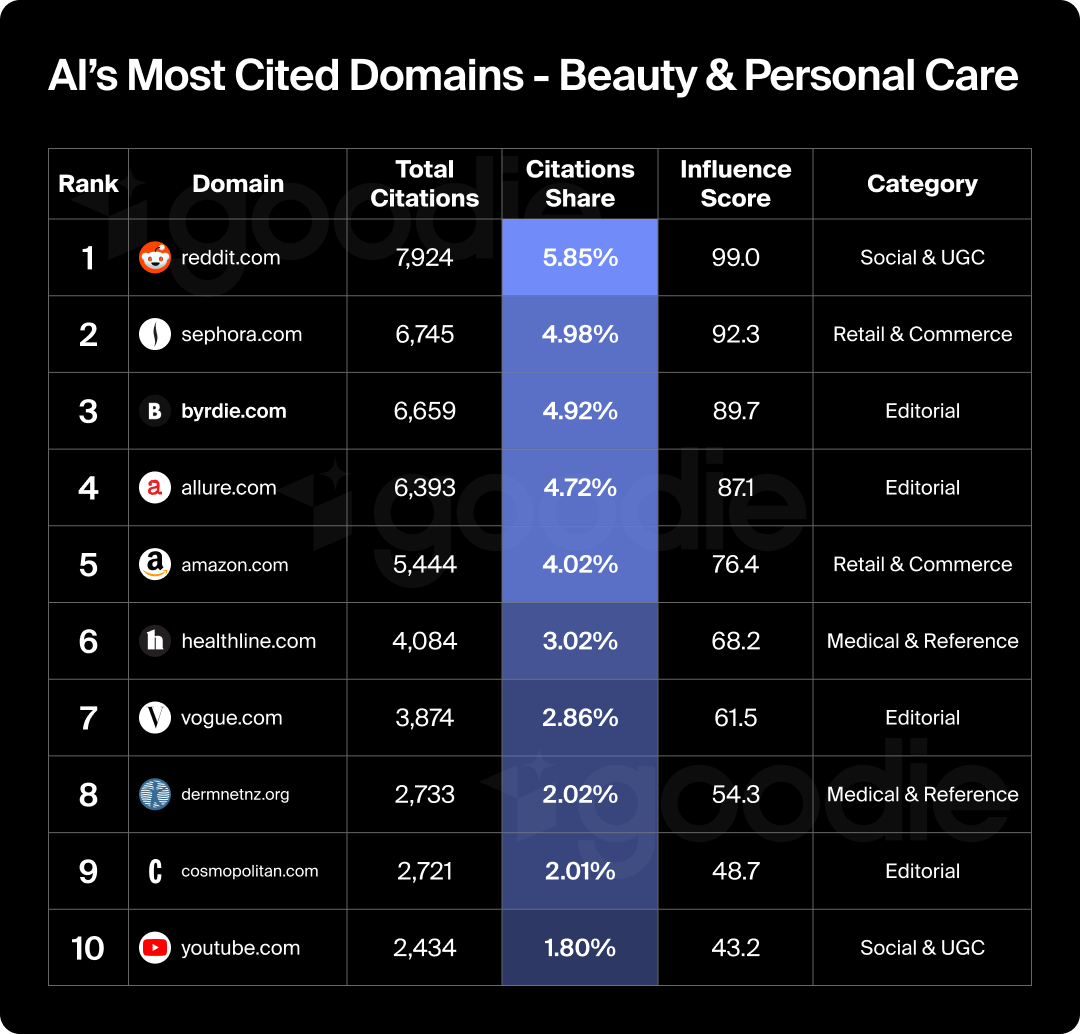
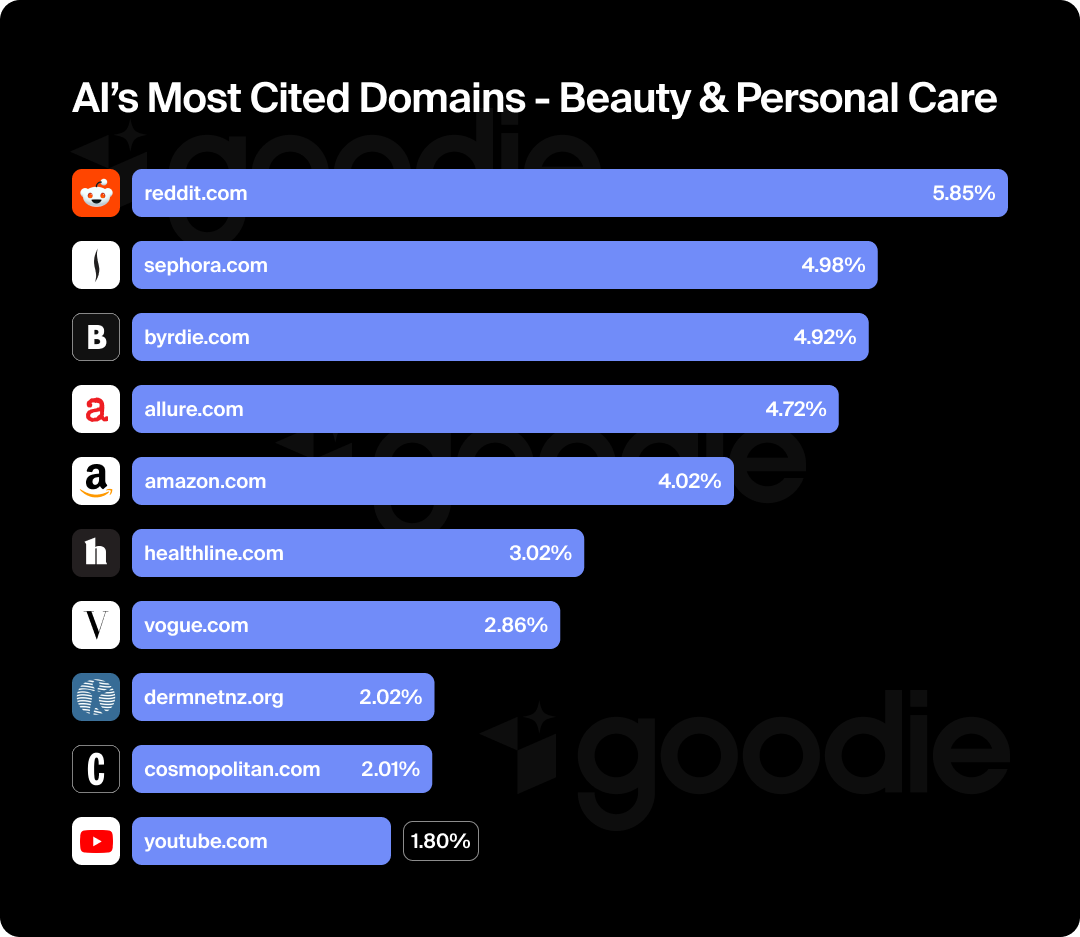
AI models don't randomly select sources; instead, they follow a sophisticated trust hierarchy that mirrors human decision-making but with algorithmic precision:

Critical Insight: Brands appearing across all four layers see 3.7x higher purchase intent than single-layer brands.
Our study showed that models don’t give all domains the same authority. In fact, when asked the same question across each LLM, questions like “best skincare routine for acne”, or “what shampoo is best for curly hair”, will cite differing sources.
This means your brand should have a well-balanced strategy that doesn’t miss any layer of the four-layer trust stack. By ensuring each of these layers are a part of your brand's PR strategy, you’ll improve visibility across LLMs.
Each of the four models we analyzed (ChatGPT, Gemini, Claude, and Perplexity), had their own preferred domains. Although there was some overlap each LLM still has a distinct choice of which domain they trust in the beauty and personal care space.
Increasing AI visibility is not only about what you’re doing on your page. As this study shows, it’s instead about finding out where and how your brand is mentioned across external sources.
Examples of questions to ask while strategizing:
These questions are a stepping stone that can take your strategy in the right direction. However, remember: with LLMs, it isn’t just about showing up in sources, it's also about the information that is being used to mention your brand.
Now, even though it may seem like a good idea to create a catch-all strategy, that isn’t always realistic. This doesn’t mean you choose one source and make that your plan; as mentioned above, not all models value the same sources of information.
The first step is to find where your customers are searching. A strategy for ChatGPT may be fundamentally different than one for Gemini. In this study we’ve broken down the different models and each of their domain’s strategic roles.

Takeaway: ChatGPT demonstrates the most sophisticated source balancing; it's the only model that consistently triangulates community sentiment, retail availability, editorial authority, and medical verification within single responses. This makes ChatGPT optimization the highest ROI activity for brands.
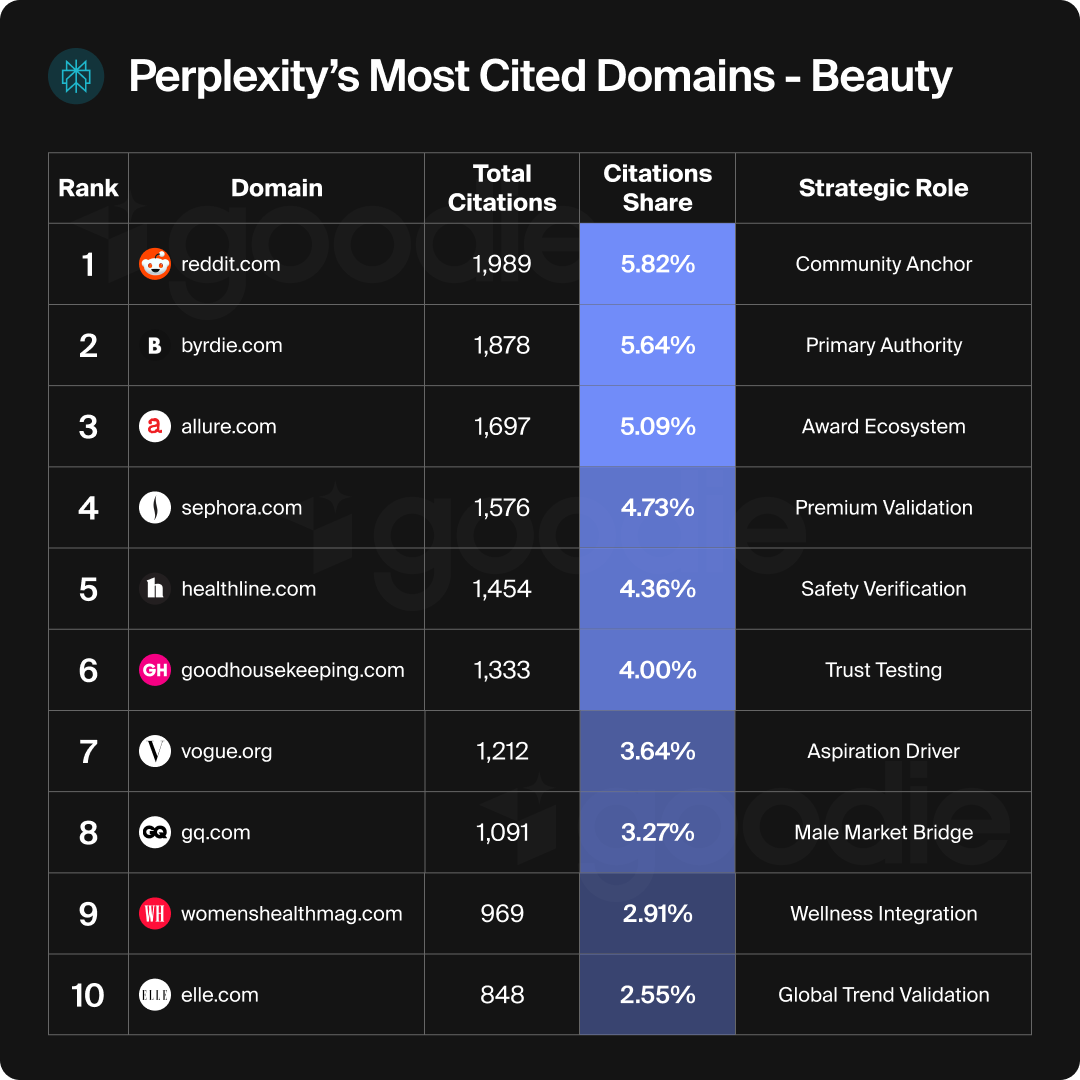
Takeaway: Perplexity over-indexes on editorial compared to the other models. It treats beauty as journalism, prioritizing tested claims and expert opinions. Brands must feed Perplexity with lab data, clinical trials, and third-party validations.

Takeaway: Claude uniquely prioritizes safety and medical verification (10.85% medical/reference vs. 6.3% average). It's the most conservative model, making it crucial for brands with sensitive skin claims or medical-grade positioning.

Takeaway: Gemini shows the strongest retail bias (14.12% pure commerce vs. 9.8% average) and notably excludes medical references from its top 10. It's optimizing for transaction completion, not education.
Understanding the importance of individual domains is not only about the domains themselves. The category matters just as much as the domain. It’s possible to understand and predict the potential a citation will include a certain category based on the prompt and the platform. We’ve broken down each individual category to help you develop a strategy.
Reddit: 76.5% of this category
YouTube: 23.5% of category
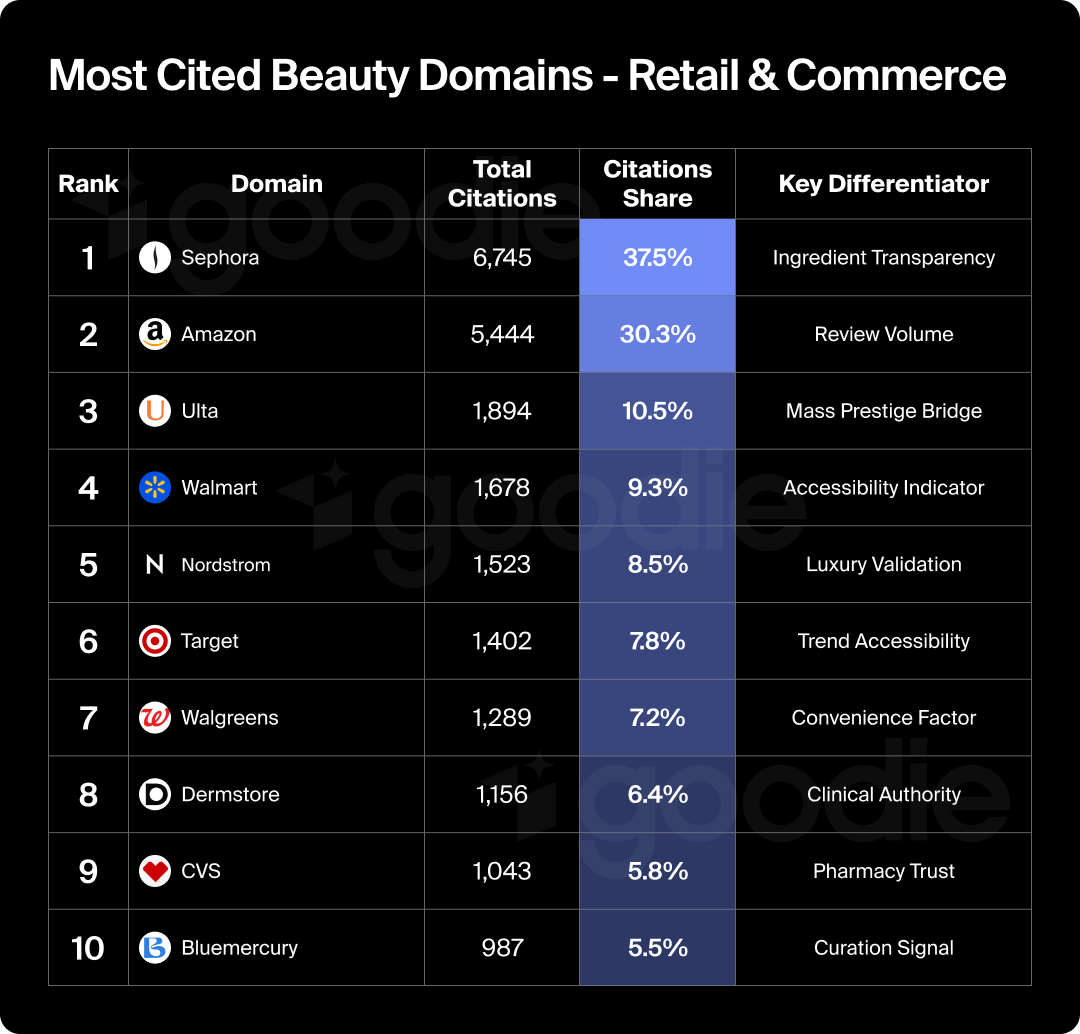
The Sephora Phenomenon: Why Sephora beats Amazon despite lower traffic:
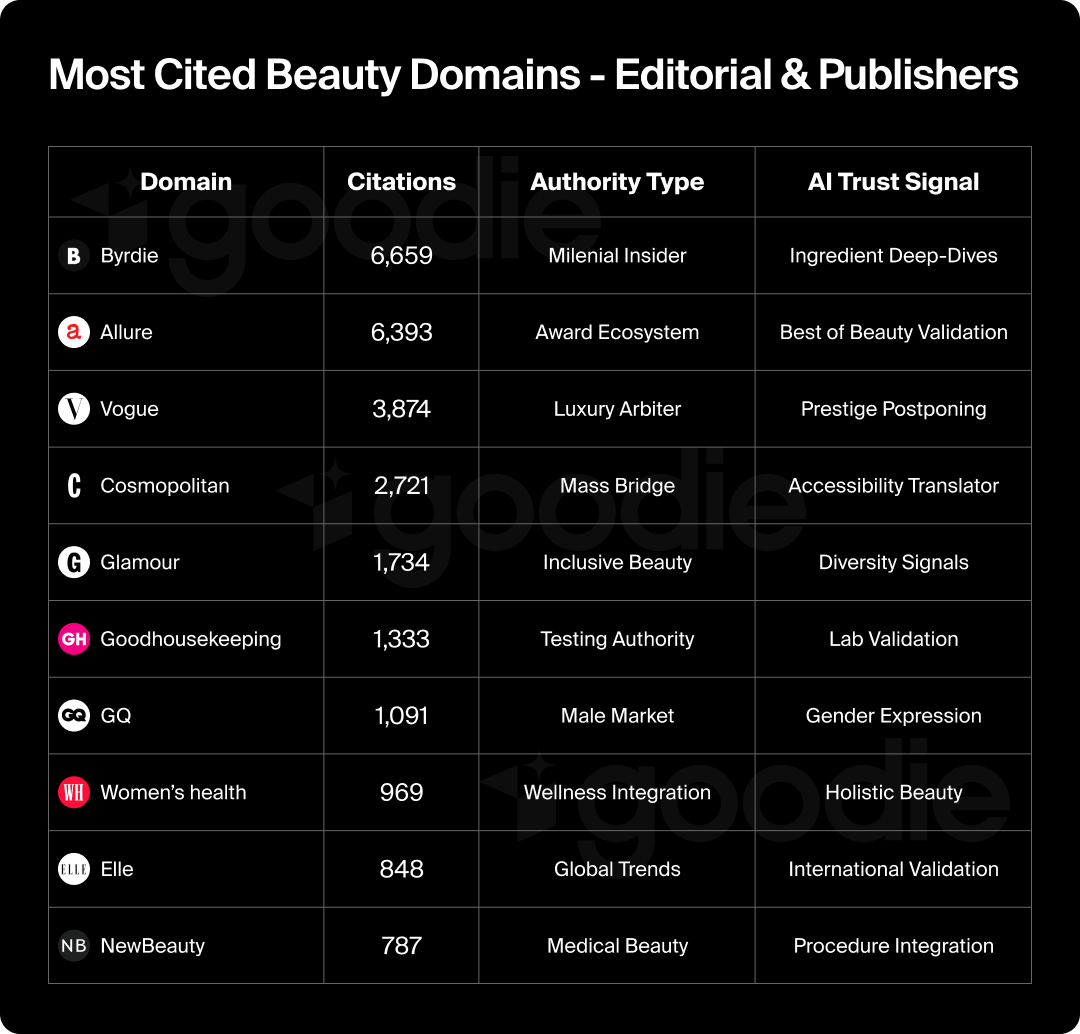
The Award Economy: Allure's "Best of Beauty" appears in 73% of "best [product category]" queries:

Critical Discovery: Products with medical reference citations show:
Brands are relatively invisible. Not a single traditional beauty brand made the top 10 across any model. This isn’t because they don’t create content, instead it’s because they’re not being cited by the sources AI models trust.
The beauty industry's future isn't being written in boardrooms or labs; it's being coded into AI models (135,419 citations at a time). The brands that understand this shift won't just survive, they'll define the next decade of beauty commerce.
The concentration of citations among top domains (36.7%) seems insurmountable, but every one of them was once a challenger. The difference? They understood the importance of authority and were already positioned to take that role in LLMs.
Where and how can you track for visibility? You might be asking whether this is even possible. SEO specialists should tap into tools like Goodie to track their brand and get recommendations for optimizations.
At Goodie we study changes in AI search and help brands win in AI search.
The data reveals not just what's happening, but what's possible. The brands that will dominate 2026 and beyond are making decisions today based on these insights. The question isn't whether you'll adapt to AI discovery, it's whether you'll lead or follow.
Original study by Mostafa ElBermawy. Special thanks to:



